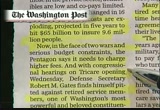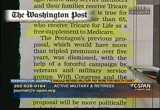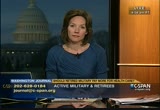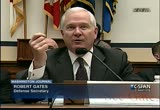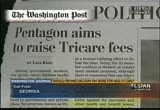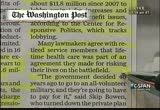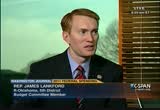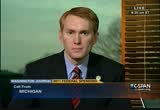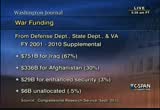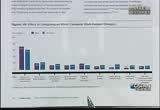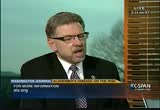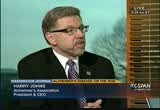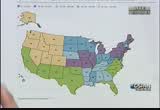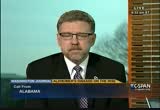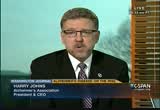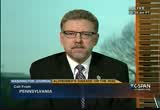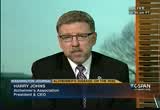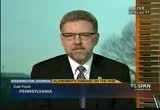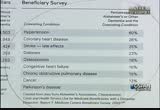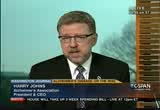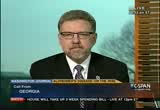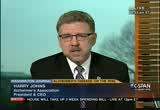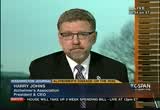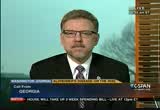tv Washington Journal CSPAN March 15, 2011 7:00am-10:00am EDT
7:00 am
republican james lankford who took -- who sits on the budget committee. that marcy kaptur research on the budget and the appropriations committee. later in the show, harry johnson of the alzheimer's association will take your calls. ♪ ♪ >> the house today is slated to begin debate on another short- term bill to keep the government running. we will talk with two house members this morning about how they plan to vote. and a new poll shows nearly two- thirds of americans say the war in afghanistan is no longer worth fighting. general petraeus will be asked about the administration's plans to withdraw from the country
7:01 am
before a senate committee this morning. live coverage on c-span 3 930. and housing and urban development secretary shaun donovan will join one other person as they are asked about the plan for fannie mae and freddie mac. news out of japan this morning, after a third explosion yesterday at the nuclear power facility. all eyes are on the situation there. we will keep you updated as we go along this morning. we begin with your thoughts on whether military retirees should pay more for health care? secretary gates is expected to make another push to require retirees to pay more in fees. congressional debates on the issue begins wednesday. we have a special line for
7:02 am
retirees and active members. all others, you can see the lines they are separated by democrats and republicans and independents. let's take a look at an article about this on this morning. defense secretary gates finds himself pitted against retired service members, one of washington's powerful and most beloved constituencies. date is back with a far more modest proposal to raise premiums.
7:03 am
7:04 am
7:05 am
especially the situation that the country is in right now, everybody should step up to the plate. those that can afford to pay more should put more in the hat at this time. i know some people that are in the military. there is a lot of waste and fraud within the system. host: senator jim webb of virginia, a democrat, has opposed this idea. here is what he says in the paper. as someone who has grown up in the military, lifetime health care for career military personnel part of our moral
7:06 am
contract between ever government and to those that have stepped forward to serve. the you think? caller: my uncle was a sergeant major. i know the sacrifices he made for the country and the sacrifices his family made. i agree, but i believe that we should take a closer look at it and see if we can trim some of the fat out of it. host: seattle, another democrat. caller: thanks for taking my call. i do not think the military should have to pay extra. the article you read earlier said, he served with the military and stay with it for three decades, we beat you up a lot, and we give you free health care. that is not fair. we give tax breaks to the rich, but to tell the veterans and
7:07 am
military that you have to pay more. i do not think that is fair or right. i think our country is reneging on a promise that we made all soldiers. you serve your country with honor, that should be a perk that you get. if you think it is unfair, i am sure you have never worn a uniform. i have worn a uniform. i think i would cut my right arm of before i would allow any veteran or anyone that has served our country and put up with what you have to put up with in the military to have them pay more, i think not. host: what about asking individuals to pay $2.50 more a month? caller: those people have probably never worn a uniform
7:08 am
before. soldiers get hurt in training exercises when there is no combat. i have seen soldiers get killed during training exercises when i was in the army. i do not believe that. i am not going for that. they should not have to pay more. host: let's hear from a retired military officer in olympia, washington. caller: i think this is a another cop out by the government. we have been betrayed in the iraq and afghanistan situation. we have given billions to billionaires. we have given money to all of these contractors that do not pay taxes. the government does not have the courage to do what is right.
7:09 am
it is easier and safer to go after people that are defenseless against the awesome power of the government. we look to of representatives to represent us the people in congress. i think they need to say no, we are not going to do this. if we want to recoup these billions that we gave to the rich from the bush administration, social security, they are just giving this money away. host: i want you to hang on the line if you can. i will show the viewers what defense secretary gates had to say back on february 16, a couple of days after the budget came out for 2012. they spoke about try care and the intentions behind it and what congress said on this issue back in the mid-1990s.
7:10 am
please listen to this. when we come back, i want to get your thoughts. >> congress settle this issue in 1995. it was not free for life. they imposed a fee of $460 a year. the issue of whether it was free or not was settled by congress in 1995. once you acknowledge that there is going to be a fee, the notion that the fee would never change is nowhere in the legislation. host: are you still with us? i want to get your reaction to that. gates said once congress decided to put fees on tri-care, part of the legislation means that the fees are allowed to go up. what do you think? caller: it does not mean any
7:11 am
sense. if i pick your pocket on monday, until i get more on tuesday, or wednesday, or thursday, or friday? what is our moral obligation to the people who serve under certain rules? i am 73 years old. i have disability. i was in vietnam. we are looking at a humongous burden on lots of young people from afghanistan and iraq, a war we should have never gotten into. we have those on reserves and the guards. these people need all of the help they can get, and they should not have to pay for it because of a political decision made that we cannot control. it is just wrong.
7:12 am
host: we told you that the "washington post" said that two- thirds of americans think afghanistan is no longer worth fighting. it is a topic most likely to come up when general petraeus testifies on the hill. he will be at the senate armed services committee today at 9:30 eastern time. live coverage on c-span3. we are talking about tri-care fees and whether or not they should go up. congressional hearings are scheduled to get under way on this issue on wednesday. an independent scholar in washington, d.c. -- caller in washington, d.c. caller: i had in two tours in afghanistan.
7:13 am
if you have someone going to college, they can sit on tri- care four years. richardfor years. -- for years. when i talk to republican servicemen the talk about cutting spending, but when you ask a retiree about increasing benefits, they balked at its. why don't you guys sacrifice a little bit more? some will have to sacrifice more than others. if people have a problem with paying more in this economy, they need to stop telling other people that they have to do more.
7:14 am
host: here are headlines about the situation in japan. here is another headline from the "boston globe." then we have the "detroit free press." lots of headlines coming out of japan this morning. people are still watching the nuclear power facility there. the "new york times" has this headline. workers told to go. emergency workers have been evacuated. all but 50 have been evacuated from the point. we will keep you updated on that
7:15 am
7:16 am
their policy is beginning to look cenacle. -- cynical. this is the "new york times" and says that clinton met with the leader of opposition for 45 minutes after attending a dinner with foreign ministers. they shared a sense of urgency but no new action or proposals. a senior administration official said that the group of eight
7:17 am
ministers wanted further clarification of what it meant. the article goes on to say about saudi entering bahrain. clinton said that she and a dollar would discuss everything that is happening. -- abdullah will discuss everything that is happening. we are talking about whether retired military should pay more for health care. what do you think? caller: absolutely pay more. so many people on social security, disability. cuts have been made to the poor, but they are going to die.
7:18 am
their heating oil has been cut off and their food has been cut off. $5 a month for a family is ridiculous to complain about that. host: athens, ga., roger is in the military. caller: i am on medicare and i also have of blue cross and blue shield and tri-care. the disabled veterans coming back from iraq and afghanistan, we can go to any veteran affairs hospital in be treated for our disability, and it is free. the problem is if you live 100 hours from a va hospital, you have to travel, and that is an inconvenience. they should give you some money for your travel pay.
7:19 am
7:21 am
other positions in the private sector. that is my concern. i am for the supportive of pain health care for our military personnel. -- paying health care for ever military personnel. but to those that are working in a private-sector position making a lot of money and are not paying, they are staying with the military health insurance, we need to look at those things closely. that is where we need to trim some of the fat. if you have the opportunity and are making a nice in come after you are retired, we should look at this accountability closely. host: indiana, an independent scholar. -- caller. caller: the retired and active- duty personnel are stepping up to the plate.
7:22 am
a majority of us will gladly pay the extra expense. i would like to see them increase the transplant for iraqi and afghanistan injured that come back. they are having a hard time getting service from the government. some of the civilian people have stepped up to the plate to help people who have had their face blown up and trying to get back to a normal life. i would pay extra taxes to help them. host: alabama, michael. what is your position? >> i am retiring in about 20 days after many years of active service. in a way i agree with the proposal to increase thetri-
7:23 am
care, but i think we are missing the big picture. this is an overall problem in health care. all insurance rates are now going up. it is not bad to havetri-care. for us, we join, we were made promises. we did not ask to go into three wars. we are moving on and people are coming behind us. they may add more cuts for those joining us today. i think we need to look at the overall health-care industry. that is where the chargers are. everybody is paying more. host: have you looked at the difference between what your
7:24 am
wife's insurance offers than tri-care? caller: the price is more. it comes down to what is best for my family. we enjoy tri-care, but not everybody takes it. most military facilities, i will not be able to go to, because i will be retired. my wife may have to move me and my family under blue cross blue shield, which will cost us considerably more. host: let me remind viewers of what secretary gates is proposing. he has a far more modest
7:25 am
proposal to raise premiums for the retirees of working age by $2.50 a month for individuals and $5 a month for families. what would that mean for your family? caller: if i take tri-care prime it would only be 500 and something a month. i will not complain about that. what happens in three years from now that as things do not get settled and health care keeps going up? then our rate is going to go up. that is one of the benefits that i think we should have as active duty and retired military. we give up a lot, but those are things we earn. when i first joined up, they told us you will have a free medical for life. i never believed that, because you could see the trend coming.
7:26 am
you have civilians say we should pay the same. were put through a lot of sacrifices. my money is capped throughout my career. i do not have enough to retire and stop working. we should get a discount on our medical. my body is broken down at this point. i will be going to the va. i also would like the opportunity to use tri-care and other things. so security would be the primary insurer when i hit 65. host: i have to leave it there. we are joined by peter ford from the christian science monitor, giving us an update on the situation.
7:27 am
what is the latest in japan? >> it is continuing uncertainty since the explosion early this morning. one of the reactors at the fukushima nuclear plant. there are fears that the casings may be cracked. the government has said today for the first time that radiation levels around the plant can endanger human health. they reiterated a warning that everybody within a 20 kilometer radius within the blast must get out. and many in the station doors. in tokyo -- stay indoors. in tokyo, a city of 30 million
7:28 am
people, the largest people -- population in the world. if radioactive materials begins to leak into the air in great quantities, it would be very bad news for tokyo. this is the fear of the moment, but no confirmation. engineers are trying to figure out what is happening. host: where are you talking to us from? guest: i am in a place about 50 miles north of the reactors. there is another one further to the west, which is causing trouble, but has not yet exploded. there are reactors in many parts of the country. it is a very densely populated
7:29 am
country, which makes these radiation leaks so overwhelming. host: are there concerns about aftershocks and what it might do to the situation, but only for the people there, but also for the nuclear power facility? guest: there have been after shocks, but none of them have been sufficiently great to do more damage. the nuclear power plant in fukushima, all of the damage has been done. it was a left between the shock of the quake and then the damage of the tsunami has been enough to damage the cooling systems or render them inoperable. that is what is causing such problems, three reactors where the cooling systems have stopped functioning. they are pumping seawater into them to try to cool tjhe rods
7:30 am
down. the radioactive steam has come out. that is not endangering human health. the real problem is the second reactor at the first plant, which exploded this morning. host: what should viewers be listening and watching for as the story unfolds? guest: when the direction. richardwind -- wind direction. everybody should be watching for whether or not the steel casing surrounding the fuel rods in the second reactor is cracked or not. the casing is not correct in the
7:31 am
other reactors. as long as the casings station tax, there will not be a problem. -- stay in tact, there will not be a problem. caller: we are seeing headlines like this that are unprecedented. is the government of japan comparing this to chernobyl? guest: they are doing everything they can to reassure people that the situation is not the chernobyl. whether or not it will become that is uncertain. it is a fear in the back of everybody's minds. the government is giving regular news briefing at the moment. they were slow in the beginning, but now they are more attentive
7:32 am
to public curiosity in fears. -- and fears. the levels around the plant are hazardous to human health. if they are exposed to one hour of radiation around the fukushima plant, they would be a sorry for radiation that -- eight times more radiation legally permissible in one year by their standards and regulations. that is harmful to human health. radiation levels in tokyo are higher than they should be, but not harmful to human health. those that are being told to do something far those in a 30 kilometer radius.
7:33 am
host: you mentioned that if the wind direction changes, he will leave where you are now. how are you able to get around the country? guest: i have rented a car. it has been with the enormous amounts of difficulty. it is hard to keep a full of gasoline. it is extremely short supply here. you have to get down on your knees and beg and explain that you are a journalist and you need to get to where you're going. i am more or less all right. if i thought i was in a position where it would be wise to i would, but if all of us are heading in the same direction, that could prove
7:34 am
difficult. host: how are you able to do that? guest: it is not easy to get around, so it has been difficult. the main highway has been closed pending studies to make sure that it is safe. bridges are down or close, because they have cracks. roads are flooded. police are blocking roads that they think are too dangerous to drive. this part of japan is extremely difficult to navigate at the moment. getting to the places that have been badly damaged is generally feasible. the difficulty is some of the areas that were worse damage are very remote. i just saw a television report about a village of several
7:35 am
thousand people, which is still completely cut off from the rest of japan and has been for the last few days. you get where you can go and do you talk to the people you find there. this has been a very difficult story to cover. it is not only because of the loss of life, seeing the devastation that i witnessed in the port of sendai are unlike anything i have ever seen before. i have covered a natural disasters for several years. i have never seen a tsunami. they damage like nothing else that nature can do. host: we wish you safe travels
7:36 am
there. we see reports that japan has asked for aid and the united states is providing that. are you seeing that on the ground? guest: i have seen it in the sense that helicopters are flying carrying huge foreign plastic bags, which i think are full of water. they are delivering emergency surprise -- supplies from those to where it is needed. i believe also heard reports that military personnel are at the fukushima plant helping the japanese decide what to do about the cooling systems. host: peter ford with the christian science monitor, thanks for spending time with us this morning.
7:37 am
he spoke about the devastation, before and after. one corp. had photos on their website abc.net. you can see what it looked like before. if he swept across it with your cursor, you can see what it looks like after the earthquake and explosion. there are several pictures on the website. another one shows a village and a town near the water. you can see the homes near the water. here is what it looks like after the earthquake and a tsunami came through. no homes and left. -- no homes left. you can scroll through and see the different before and after pictures. a nuclear safety project director for the union of concerned scientists is on the
7:38 am
phone with us. david, we want to get into the net and bolts of this situation. we heard peter ford talked-about cracking at the second reactor. can you explain that a little bit more and what you are watching for? guest: the reports coming out of japan is that the primary containment structure, the steel casings that encloses the nuclear fuel, has been breached, or is leaking. the positive side of that is that the pressure inside was the kaine, which suggests something is leaking else wedecay -- decaying, which suggest something is leaking somewhere else. it provides a pathway for
7:39 am
radioactivity to get outside where it can cause harm. host: what does this all mean? can you walk us through the different scenarios? guest: the best scenario would be the attempt to inject c water to cool the reactor is continue to be successful -- seawater to cool the reactors continue to be successful. the medium outcome is, looks like there has been fuel damage in all three, with reports of continued problems in unit two, that could allow the v-8 -- radioactivity from the damaged part to get outside and
7:40 am
authorities would have to deal with the evacuation and other things. the worst case scenario would be continued damage. cooling on unit two is still problematic. it starts and stops. there is a report of the night of a fire on the fourth reactor at the site. that fire was from one area that contains radioactive materials. workers are still trying to get control of the situation if they are successful, things will improve. if things continue to degrade, it could be a very bad time for a quite well into the future. host: worst case scenario outside of japan, people are talking about wind changes.
7:41 am
in the u.s. was close proximity to japan? guest: radioactivity -- radioactive material could be released and a blow across the pacific -- it is such a long distance that the radioactive material would be diluted by that passage. with radioactivity, you never know. the worst thing would be the winds. to us in a rain deposits in the low concentrated places on the west coast. it is too early to project those scenarios. the radioactive cloud has not left japan. it is hard to speculate as to what would happen. host: thanks for your time this morning. guest: thanks. host: i told you about before
7:42 am
and after pictures. the website is abc.net.eu. missouri, a democrat, thanks for waiting. caller: i do not think retired veterans should have to sacrifice anything more for this country. it is a shame that ever teachers and military are asked to sacrifice more caused by wall street and now wall street wants 20 billion more in aid on top of what we give them every year so they can steal more? until these cuts are made and these people are made to sacrifice, which should not cut the veteran benefits. host: let's hear from a retired
7:43 am
military person in houston. caller: i am in my eighties. i joined the military when i was 15 years old. i fought the second world war ,korea and nam. it is not the small increase in tri-care. congress will give themselves anything -- everything. most of them have not even serves. they do not care much about anyone except for themselves. senator reid comes across with this cowboy stuff. that is sickening. i do not want to see some girl missing an arm or leg because
7:44 am
some guy from texas got us in a problem that we never should have been in. they listen to liars. they never listen from history. host: you joined the army when you were how old? caller: i joined the navy when i was 15. there were some in their deaths were 13 -- that were 13. host: how was that possible? caller: it was the second world war, are you kidding me? you have no idea what we went through, what our generation went through. you do not understand us. you never will. we built this country. people come across the border down there in san diego and they are ill, they run right to the
7:45 am
hospital. we pay for that. how many people employed these illegals and they never paid taxes for into social security. host: we will leave it there. san diego, you are next. caller: i cannot wrap my head around the fact that the cover government gives tax breaks to people where half of the country does not have the wealth. they should be ashamed of themselves. veterans should not have to pay for any things. when our country keep taxing the middle class and the people that are making the money off of this war, the profiteers from halliburton -- they are getting rich off of the war. let them pay for it. and what the guy said about
7:46 am
people coming across the border and getting free health care, we cannot get angry at our neighbors, because the government wants to pit us against them. host: let me remind you about this plan that secretary gates will put forward. individual coverage would rise. let's go to illinois. independent caller. caller: i am a disabled veteran. i joined in 1976. they wanted an all volunteer army or military. i was promised health care for life, but if you drive up in a rolls-royce expecting free health care, you will not get
7:47 am
it. my wages have been -- been depressed over the years. i cannot even get a job. i am disabled. i am on so security, disability , and i am on oxygen 24 hours a day. i was promised health care for life. for these people that did not even serve in the military to have anything to say -- it is like a contractual agreement between two people. i said i would join the military, and i did my time. i got an honorable discharge. for this month gates died to try to remake of the deal -- guy to try to renig on the deal because they are giving money to
7:48 am
these millionaires, it is not fair. host: we will leave it there. here is the metro section of the "washington post." the nra has been invited to meetings, but they have declined. and the business section of the "washington post" the game has changed. we will return to defense spending in about 45 minutes when we speak to an ohio democrat who is on the appropriations committee. coming up next, we will turn our attention to the upcoming resolution that will be voted on the house floor today. we will speak to a freshman
7:49 am
republican james lankford about his vote. we will be right back. ♪ ♪ >> with current temporary spending expiring this friday, the house and senate are working on another short-term funding measure to last through april 8. watch the debate in its and hiring on the c-span congressional chronicle, with a complete timeline and transcript of every house session, and c- span.org slash congress. >> you can listen to c-span
7:50 am
signature programming on itunes. people in the news on newsmakers and interesting conversation on q and a. this into a variety of public affairs programming. everything you need to know is online at c-span.org slash podcasts. >> in step ,ishmael reed, on april 3. join us for 3 hour conversation. it is sunday on c-span2 on april 3. you can also find the entire weekend schedule online. "washington journal" continues.
7:51 am
host: james lankford was elected in oklahoma. let me begin with this headline. for you going to vote for this three week extension? guest: a lot of frustration in the republican conference. it is frustrating that as freshmen we are walking into a problem that started in the last session and no budget was done. for the first time since 1974, a new congress is walking in and no budget to run the country. there are multiple issues. we have a 2012 budget.
7:52 am
we have to deal with the 2011 budget when we are six months for it. there is a lot of conversation about where does this go and how do we resolve this. we sent a budget from the house to the senate, and they voted it down. they created their own budget and voted it down. we are waiting to see their response. host: what would make you say yes to the three week extension? guest: we are getting to the end of this. we are not going to trickle this along. the big issue is a lot of policies being passed. defense spending and fbi cannot move forward. during continuing resolution, you cannot make major policy changes. you are stuck.
7:53 am
defense has to do what was passed in 2009. they are stuck. they cannot face a system out during a continuing resolution. we need to make sure of our government is not stuck in this holding pattern. i have meetings after i leave here. host: who are you meeting with? guest: the entire republican conference. we have to hear what the plan is from here, where are we headed? what is the next step? we have these different policies that were put into place before. these are social and financial issues. there were things put in there that say here are ways to cut back that is practical. we need to find them. right now i am listening. host: are you willing to have
7:54 am
the government shut down if you are not getting the confidence from the republican leaders that you are near the end? guest: i have heard the comment about a government shutdown. many democrats are talking about it. republicans are talking about passing something to keep the government going. we want to continue to cut spending every time. the senate sat on it. we sent over a second piece. it is almost like the senate is a taunting the house. it is almost like they want to say look at the mean republicans shutting the government down. that is not what we want to do. we want to continue funding the government so it can keep going and cut spending.
7:55 am
the first continuing resolution cut 2 billion the first week, and 2 billion the second week. we are still on track to cut the same amount of money, we just cannot keep trickling it along. host: a vote was taken on what the chairman put forth. it is about half, 51 billion in cuts. then we took a vote on what house republicans put on the floor. in other words, they have said, we are willing to compromise, but are you willing to compromise? guest: i have not seen a compromise yet. it was not 51 billion. it was not even 5 billion. we have cut more in these three weeks than what they were going to cut in six months.
7:56 am
we put a bill out, proposed it, pass it, they do the same and send it back. they have yet to send one back. they ask us to do another one, and we tell them, we sent you one. we are waiting for it to come back. host: there is willingness to compromise from your perspective. guest: sure. host: here is this washington post poll in the papers. do you think a partial shutdown of the government would be a bad thing? 63% said yes. are you concerned about that? there is a sweeping indicator of dissatisfaction with washington. only 26% of americans say they are optimistic about our government and how it works.
7:57 am
guest: i agree. my frustration when i walked in -- coming from outside of the system, i said, how can we make this work. the conversation here is how can we score political points. it should be about getting things done. they are just talking about it instead. it was weeks before they even took it up and had a debate. we are waiting to say can the senate get things done. we have done our part. host: did you think it would be easier when you came here? guest: no. the issues that we deal with as a nation in our spending is so astronomical. it is just 435 members. if you can get them to agree on anything, you are dealing pretty well.
7:58 am
then you deal with the senate and the president. our government and constitutional system was set up to move a slow. that is so that people can think things through and have feedback on it. that is a good thing. when there is not a budget from last year and you try to do one in the middle of the year, it makes things tougher. host: some republicans have expressed frustration that there are not so-called riders in this legislation. where are you on those, and would you like to see those things added? guest: i would like us to take a look at everything in the budget. there are many things we need to look at.
7:59 am
i am open to those options. i am listening to leadership to see where we are headed and what we are trying to accomplish. we are dealing with the funding for the next six months. this program is not going to go away if we are going to cut it off. this is only for the next six months. host: michael is in westchester county, new york. caller: you and the tea party and of right wing conservatives are a bunch of wackos. take the last year's budget, run it through october 1. take citizens united and to start a public funding system so that everyone can get elected.
8:00 am
you are going to send this country back into bankruptcy. host: did you get tea party support? guest: in oklahoma, there was a function key party, but they focused on issues. there were no tea party candidates. host: did you get support from those who were in favor of the two-party movement? guest: sure. but like i said, there was no endorsement, so i cannot tell you how they voted in the end. host: are you going to join the team party? guest: no, that is not something i want to do. host: david in smithfield, georgia. caller: i keep on hearing about
8:01 am
tightening the belt, but nobody talks about the companies in america tightening their belts. if we went back to a flat tax, no tax break, no tax shelters, everyone pays 10%, that would help our economy, the american families, and it would let big business pay what they should pay. guest: here is one of the big issues we are dealing with that. people at oil companies are making a lot of money. we are dealing with a major energy crunch right now. people can look at oil companies and say, they have record profits and we have record high prices. the fact is, we are dealing with record high prices in oil. if we could add energy from our own country, we could manage that and it would be different.
8:02 am
fluctuations from overseas would not still be occurring, at this point. people also talk about oil companies getting tax breaks. it is that ability to write off their business expenses. it is the same as other companies. people say that they are larger and these small companies, but they are, they are larger businesses. people want to pick on that. what would they do if they pulled that out? they would raise the price of gas again. this is not the time to do that. right now is the time to deal with energy policy. i have been hearing my entire life, we need a new energy policy. then i get here, and we are still talking about the same
8:03 am
thing. host: michael on the democratic line. newnan, ga.. guest: how are you this morning? -- caller: how are you this morning? guest: very good. caller: did you vote for a motion of the reading is fundamental? guest: [unintelligible] also, did you vote to continue nascar? guest: democrats wanted to prohibit the military from advertising in nascar.
8:04 am
we thought, was this just a shot at nascar? it is a reason for advertising. it was, honestly, a cheap shot to anyone that follows nascar. i do not see an issue with that. tom is a republican in millbrook, new york. guest: i just want to mention, i work for the porter graphically wealthy. it seems in the last four, five years, the amount of their disposable income is absolutely absurd. i have been a conservative all my life. i cannot agree to a different tax rate. if you are wealthy, you do not
8:05 am
need a tax cut, forget it. if you are poor and need it, we have a tax cut. it just seems there is too much disparity here. you would agree this whole tax system needs an overhaul of some kind. guest: absolutely, we need an overhaul of the tax structure. we did in the 1980's where we had a simple tax structure. we need to do that again. right now, the tax code is nine times longer than the bible. it is a mess. host: what were your thoughts when the deficit commission came out with a recommendation to simplify the tax code? guest: i would absolutely agree. we need to look at making it flatter, simpler, easier to navigate, fewer exemptions and
8:06 am
easier so that people do not have to go through pages and pages to see who is in or out. if people cannot get money getting to them, they will just supply for more taxes. host: for example, the mortgage interest deduction -- those sorts of things -- to lower their tax rate? guest: our country runs on inexpensive energy and construction. if we do not have those going on in other places of the country, it becomes difficult for the country to function. commercial and residential way, this is where you see the slowdown. several years ago, we had a smash in the housing market. purchasing slowed down dramatically. at the same time, gas shot up to
8:07 am
about $4 a gallon. we had this sudden drop in everything. food prices go up, travel prices. everything accelerates as you are dealing with high energy costs and high construction costs. host: marina is an independent. westfield, massachusetts. caller: good morning. we cannot fix this problem until we fix what caused it, and that is the regulation, which made -- deregulation, which made the housing market crash. guest: which part of deregulation specifically? caller: wall street.
8:08 am
everything will get cheaper, inflation will go away. food prices will go down. you people do not want to address the causes of these things. guest: it is funny to hear "you people" on this. i am the outsider walking in. i am an individual that had never been in politics before. three months ago, i was a normal citizen, now i am "you people." dealing with the speed limit, obviously, states can take that on. if we are going to try to mandate everyone the speed limit, it is just more of the government trying to use their power.
8:09 am
maybe they should look at other ideas of changing stop signs to yield signs. the real issue is, we have a supply issue. we have issues with getting it out of the ground. i am a proponent of natural gas. it is a great feel that is american, many of our vehicles could be shifted over to it quickly if you drive through oklahoma city, you have signs showing natural-gas for $1.35 a gallon. that is a big difference. i think that is a good thing. we need to find some other options for fuel. host: longview, texas. guest: good morning. i had an uncle there. nice to talk to you. caller: i am considered lower middle class. what needs to happen with this
8:10 am
fiscal spending is people on medicaid, accept for the disabled, i would cut everyone of them off. i would roll back the food stamp program 50%. i would do away with the earned income credit and child tax credit. i do not believe in rewarding people for having children. and doing away with the tnff program is another thing. the republicans need to come out and say, to the poor people, we love you but we cannot help you any more. you are going to spiral us into bankruptcy if we do not do it right now. if we tell them that, in her love, show them on paper, that is what will happen. guest: right now, we have 70 programs under welfare,
8:11 am
different benefits that are out there. what we need to have is a shift. with the shift in the one program, what we said was, we want you to work if you are able to. most americans would say, if and american is an adult and they should work, they should be working. this is not a slap to the fore. many are engaged and working part. they are to be blessed and encourage.d we need people to be engaging in work. we need to be blasting those that are providing the economy. host: what is your background?
8:12 am
guest: i was a counselor at one of the largest christian camps. i was the director until 2009. host: how does that help you in this new job? guest: you dealt with people all the time. i have had the option to say, -- i did not have the option to say, somebody else will look at that. i was the director. you are dealing with staff issues, budget issues. one of the things i learned is, most people just want to be heard, they want to talk about the issues. has anyone thought about this? we have got to continue moving forward. we cannot just yell at people.
8:13 am
i think you are this. that does that help us move forward. we have to solve our problems. that is what i did before and what i hope to do now. host: gary is a republican. dayton, ohio. caller: i am interested in energy. i agree with him about natural gas. they have run it for years in factories for fork lifts. also, this nuclear that they are talking about, in dayton, they had to shut down at a hydroelectric plant. they tore it down so that ge could build one in cincinnati. they could not pay enough people off to get the plant in.
8:14 am
they did not have the right water to handle a nuclear plant. what is wrong with hydraulic elector? guest: hydro electric car great options. when people talk about alternative energy options, hydro electric, solar, wind, biofuels. 7% of american energy consumption comes from alternative energy. 93% comes from coal, gas, and oil. are talking aboutn granting of these other forms of energy, hydro electric is our largest contributor. there are only so many places where we can put a dam to capture that energy. but for the foreseeable future, we will still be using fossil
8:15 am
fuels. you cannot just shut them off. we are going to use all by a fuel, wind, solar. 1% of our energy come from solar and wind. that is not enough to power america. host: our guest is a member of the oversight and government reform committee. richmond, virginia. roy on the republican line. guest: good morning, roy. caller: i get so tired of people playing class warfare and demonizing the party. wall street did not give us $14 trillion in debt, our government did. it was because they subsidize and manipulate everything. we have a party on the left that it does not want to do anything, they do not want to cut anything. they want to wait for the
8:16 am
republicans to do something so they can demonize them. the debt is going to keep going up because the democrat party is being run by socialists and progressives who want to run the government because that is where they get their money from, that is their voter base. they will continue to do that until they make us go bankrupt and we no longer have any wealthy people. god bless you for what you are trying to do. keep up the good work, fight the good fight. don't worry about what the polls say. guest: honestly, i am not that much different from americans. i would encourage others who have not been involved in politics to get involved. i think people would be surprised, honestly, if they walked around the house of representatives.
8:17 am
they would say, some of these people look pretty normal. they look like my neighbor. we are as diverse as america, when you walk around the chamber floor. there are many people that do not have a long history and politics. i will also mention something about democrats. there are some that are working hard on the issues, working toward solutions. and there are also some republicans that are just trying to bash each other and go from there. but there are a lot of people in beijing in ideas. host: do you see that dynamic in your own party? guest: i really do not. speaker john boehner has been very humble in his leadership. if you look and what he has done, he has moved things forward, he is listening to people, and is doing a terrific job hearing out diverse groups.
8:18 am
you look at something like hr1, when we walked through all of the spending cuts. we brought a resolution to the floor and anybody could bring an amendment to the floor. if you want to make a change, let's debate it. that had never been done before. let's allow the people's house to be the people's house. in the past few years, there was no open debate. he is tried to get more people involved. we had democrats that brought spending cuts to the floor. anthony wiener was one of my favorite presenters. he was talking about the fact that we are continuing to subsidize mo hair. we are continue to subsidize goat farmers. nothing wrong with it, but we
8:19 am
should probably not be subsidizing it. that is good, useful. democrats and republicans are bringing things to the floor, looking at things to cut back. postcode entitlement reform, is it on the table for you? guest: it is on the table for me in this area. i have noticed in this city people think long term and think beyond the budget window. if you are going to make changes in social security, medicare, it is not going to be made in the next 10 years. 55 years and older, we are not going to touch it at all, but that does not fall into a 10- year window. you are talking about people that are younger. is it going to be there the same way that it is now when i am 65?
8:20 am
no, there is not. yes, we need entitlement reform, but that does not mean we are going to scare the elderly away. it is no different from what president reagan did in the 1980's. he came together with tip o'neill to solve their problems. host: joe is a democrat in month, county. -- mcdonald county. caller: i have a couple of things to say, and then i would say some things about c-span. i worked for a natural gas company in 1972. then we had this first so- called oil energy problem. it was made up to start with. there was no problem with oil. cng, compressed natural gas.
8:21 am
we had a unit that was clean burning, ran twice as long as on gasoline, but nobody would buy it. for 50 years -- we, being the u.s. -- we are supposed to be the greatest country in the world. no offense to brazil, but they are close to a third world country and the day can wean themselves off of oil. host: we have to leave it there. what did you want to say? caller: it is not fair that we can call once a year. but people on twitter can write in every day, even twice a day. i have seen some people there almost twice a day.
8:22 am
host: we are doing our best to balance the two. point taken. guest: people talk about how the government's slow down the events of the economy. people smash the oil companies all the time, but most of the energy producers are small companies. they are manufacturers that make me valves, fuel injectors. millions of jobs are involved in these energy companies. those independent producers can also turn around and invest in retail facilities. people say we need more subsidies to get natural gas out there. it is a great fuel option.
8:23 am
the reason there are not enough stations is because our tax policy close down the distribution of stations around the country. let's allow them to invest in that and then maybe we can start transitioning to $1.39 energy. host: next phone call. caller: on the republicans and democrats, why can you sit down at the table and decide what is best for america? why can we just sit down and work at what is best for america? we are all americans. changing age ofhange calle social security. you are working people longer. then people coming out of college have to wait longer.
8:24 am
host: that was charlie in columbus, ohio. guest: it is frustrating the way we are not able to work things out. your typical hearing function differently than any other board room in america. i am going to do a short five- minute speech. someone else is going to do a 5- minute speech back. then there is questioning. there is not a lot of interplay back and forth. those happen in the hallways and meeting places. host: how would you do it differently? guest: there needs to be some back and forth. that needs to happen in places other than formal meetings. host: so do away with opening statements? guest: no, opening statements
8:25 am
are fine. they address the issues. some of them, however, are planning to the camera. but to have a conversation, and to open it up -- instead of just having someone hammer on somebody else. there are people here that came to testify at this hearing, and instead they are hearing us bicker and gripe at each other. there are ways to simplify that to have a conversation. host: gary in cincinnati, ohio. good morning. caller: i just want to make some comments and get an opinion. i am thinking, if everybody got together and gave up one day of what they worked a year, give of sick day, holiday pay, all of
8:26 am
the charlie sheen's in america -- they could not make money anywhere else. let's come together and pay off our debt. take some weight off of the politician's shoulders so they can sit down and actually think of something. their brains are not working right. we are paying $0.40 on every dollar. if you have $1,000 in the bank, now you have $1,400. let's pay the debt off. guest: that would be a tougher to do it. people could give more in their income taxes. that would be a big help. few people do that. but when you are dealing with $14 trillion, it is hard to get your head around that. people have said, if you just
8:27 am
cut this program, we are done. we borrow what we do for every single federal agency and program as a government come and all of the military spending. all of that is borrowed. and we would have to shut down every agency and all the military spending to get even close. we need a long-term plan. it took us a long time to build up this amount of debt. it will take us awhile to turn this around. we have to start putting this down. host: first, the pentagon, foot 4 by secretary gates. he want to go after $14 billion in personnel costs. when we to do that is to raise the fee for try care -- tricare. he has been pushed back by members of congress.
8:28 am
they do not like the idea. raising the and not $5 -- the amount $5 per individual. guest: when you spread it across the entire military, it makes a big difference. one thing that i like that secretary gates is doing is he is looking at everything. whether it is weapons functions or whatever. the hope is we're not cutting military budget, but we can actually have savings where we can invest in the defense spending side. everything has to be on the table. every proposal. i will be one of the first people to fight for veterans benefits. i will have to look at the
8:29 am
details to see how things work out. i have yet to see a veteran yet that said i thought for us, i fought for freedom, i want us to go into debt. i only hear, keep your promise. and that is not in the nature of our veterans. they are patriotic people that want to do the best fourth half of our country. host: 1 last phone call. dee is a democrat in detroit. caller: thank you for taking my call. listening to the representative for earlier, when he was asked about the oil companies getting tax breaks, he did not go into a lot of detail about the
8:30 am
millions and millions of dollars they had in profits. they have all this money in profits, so why do they need tax breaks? another question i had had to do with -- the republicans seem to want everyone to pay it -- take a pay cut. my question is, what are his feelings on this? i think you said he paid $1,500 in copays per year, but a lot of people do not have that money. what would you suggest congress does in terms of addressing these ills and everything else we have to put up with? one last question. it seems to me, congress forgets why they are in washington, d.c.
8:31 am
they seem to think that they are there for themselves. they are not. they are there for us. we sent you there to work for us. guest: i could not agree more. as i mentioned earlier, i am the new guy in congress. there are 96 others like me that came from the outside because we want to come to work. i get up early in the morning, i worked until almost 1:00 a.m.. i came here to work. in terms of dealing with the financial realities in congress, one of the first things we did was cut our budget. that was the first thing we did. we have fewer staff in my office and what is typical. we cut staffing, salaries, how we are doing things, our own benefits.
8:32 am
i often hear about health care benefits. i pay for those things. i am in the social security program. those things are true for us. there are things that we have to deal with as congressman as well. host: the comment about members of congress coming here and working for themselves. you believe in term limits. what do you believe is sufficient? guest: let me say it this way. i do not like self-imposed term limits. that just puts you in a lame- duck session. in oklahoma, we made the shift a few years ago where we have term limits for everyone in the house and senate. that provides a good turnover of leadership. i have no delusion that i am the smartest person in the fifth district of oklahoma. there are a lot of people that could probably do it better.
8:33 am
i would have to say everyone in the house and senate needs a term limit imposed on them. of course, that would need a constitutional shift. maybe 10 years in the house, 18 years in the senate. it provides some turnover. host: thank you for being here. we are going to get the other perspective from r.c. chapter, a democrat from ohio. we will be right back.
8:34 am
>> in the 21st century, it is not enough to leave no child behind. we need to help every child get ahead. we need to get every child on a path to academic excellence. >> president obama has called on congress to overhaul the no child left behind law. follow the law from the bush administration, the proponents and detractors, and where it stands today. certification, watch, clip, share. it is washington, your way. >> right now, you can listen to c-span signature programming on your itunes or mp3 player.
8:35 am
listen to a variety of public affairs podcasts when ever you want. everything you need to know is on line at c-span.org/podcasts. >> on television, radio, and on line. c-span. bringing public affairs to you. created by cable, it is washington your way. host: marcy kaptur is a democrat of ohio represents the ninth district. sits on the appropriations committee and budget committee. here to talk about the house will be voting on this continuing resolution to keep the government funding for another three weeks. where do you see compromise? what would you agree to with republicans? guest: well, we have all been given the a narrow lilly pad to stand on, in that most of the
8:36 am
budget and tax preferences -- in fact, all of them, and a major share of them -- are off the table. in a way, they are trying to balance the budget. i think it is a mathematical impossibility. what is happening is, only 14% of what is possible, in terms of the budget itself, is on the table. then you have huge issues like tax preferences. the largest wall street banks last year made over $51 billion. just six things, the ones that caused the mess we are in now. their executives made millions in dollars. none of that is on the table. bonuses are not on the table. oil company profits in the third quarter of last year, exxon mobile, made $9 billion in one quarter, as people's gas prices
8:37 am
are going up? none of that is on the table. defense spending his summers on the table. host: defense spending is on the table. where are you with those? guest: we are looking at $15 billion in cuts that were included in the appropriations bill that moves forward. defense spends more than all of the other agencies of the federal government put together. over $600 billion, counting the two wars we are conducting. wawr is -- war is very expensive. it costs $400 a gallon to deliver a gallon of fuel to our troops. the defense portion is off the table. we cannot short our troops, our military.
8:38 am
we can that short care for those people putting their lives on the line. less than 1% of american families are actually richard keatincontributed to the war ef. george bush decided he would start wars without paying for them, and now we are inheriting that. if you look at defense, it is in the contract accounts. there are more contractors on the ground than there are soldiers in the field. we could bring them back into the military, 1st for security reasons, and then budget reasons. host: if you look at the request --m the merpresident, guest: and what usually happens
8:39 am
is, that is the bottom line and then you get additional requests later for augmented spending. we need some extra spending to do this. so you have supplementals that are often added on top. so that is the minimum. host: about $750 billion for iraq. just in the 2010 supplemental. $360 billion for afghanistan. $29 billion for enhanced security. $6 billion is unallocated. defense secretary gates has talked about this continuing resolution and have congress is going through these extensions. do you have concerns about that? guest: deep concerns. first of all, all of these fits and starts are not a good sign to the economy, to those tried to make long-term decisions.
8:40 am
that is an effect of the department of defense. secretary gates is an incredible american. workally has done yeoman's there. he has shown great intelligence, composure, in sight, and is a great manager. it makes it difficult for them, with all of the contract in the door is they are responsible for, to plan what to do in july or august. no business would operate in this way where you do not know what your bottom line is for the year. you budget early, spend that, and then maybe at the end of the year you are lucky and do not spend as much as you thought. short-term spending is not a good way to run anything. host: john mccain has said that when this extension comes to the floor, he will likely propose an amendment that would the long
8:41 am
term funding until september 30, for just the pentagon. if that were to become something that comes to conference, would you agree to that? guest: i would be reluctant to court in defense off. what tends to happen is, it is a large force that moves the other bills. if you keep it sacrosanct, if you move it away from the other appropriations bills, it puts into a special category. i understand what he is trying to achieve, a good effort to put out there, but in terms of the reality of how we move bills, in order to get 218 in the house to support the bill, perhaps if it moves into an omnibus, we do not know, but you need to pull the entire team of horses over the line. host: you praised secretary
8:42 am
gates' argument for cutting, reforms to wants to put forward. his exit strategy has raised issues, according to this story. some say that that puts the pentagon and congress in a bad position because they are not sure which performs he will be pushing fourth. do you think secretary gates will come out and say this will be my last day? guest: from a strategic standpoint, that is dangerous. he is signalling a shift and is trying to move to a different place. a place where america wants to move. it also means there needs to be security on the ground in these countries, forces trained up. i can assure you, in afghanistan, for example, the kind of training we thought would have occurred two years ago have only as of late began
8:43 am
to lock in a little bit. i think he has to parse his words and be cautious with what he says, but he is trying to show direction. i support him in that. host: our digital bus is visiting west in its high school. about 10 social studies students will be participating in the show, asking questions. over five and a 35 students attend. we want to thank cox communications for organizing this. our first question is from a senior, jose garcia. go ahead and ask your question. guest: caller
8:44 am
caller: given the unrest in the middle east, what do you think we should do about military spending? guest: thank you for participating. you are the first person. i think we need to be very careful about defense spending and the time we are living. there is so much instability in the middle east and in north africa. i think the importance in that region is working with the arab league, working with our allies in the region, so that united states is not the only country taking the lead at the tip of the spear, so to speak. on the policy side, we can do better. i know secretary clinton is traveling over there. she has been meeting with some of the leaders. i am hoping to see more robust engagement by other countries in
8:45 am
the region. we depend on that area for oil. honestly, we need more countries in that region to measure up. in that way, ultimately, we can move down our defense spending. host: would you support a new- fly zone, as had been supported by a terribly, u.n.? guest: i am open to it, but i am supportive of the fact that others are engaged. host: next question. caller: good morning. i know we have over 100,000 military bases. how many of those bases do we need to keep open? it seems we could save a lot of money closing those bases. i do think we are spending way too much in the middle east.
8:46 am
guest: first of all, thank you for calling in, mary. it is the number of bases that we officially acknowledged, and then unofficial would stagger most americans if they knew. i thing we need a broad view of our presence around the world. certainly, after world war ii -- some of our global architecture relates to that. we need to look around the world, without question. the u.s. has the greatest level of liberty than any other place in the world. we do have a responsibility. the predominant responsibility for this generation and the next is to really form alliances with leaders of other nations that share our values and get them to help us extend
8:47 am
liberties, hopefully, in a developmental away, so we do not need so many military bases. even the pentagon admits that they cannot win with military alone. two-thirds of the job is diplomacy and community development. if we would have been more successful there, we would not be having these wars. i hope as a country, we can move to that new day, in this new century, and hopefully wind down these wars sooner rather than later. host: back to our digital bus. we have a freshman. caller: good morning. you said secretary gates is a great american. what do you specifically like and what do you think he can do better? guest: thank you for calling in. by the way, i want to ask, how
8:48 am
much do you pay for fresh water out there in phoenix? maybe somebody can talk about the water situation. host: they are joining us via skype. ofelia, do you want to answer that? caller: they are not too bad, but gas prices are starting to get that. guest: thank you so much. when specifically do i like about secretary gates? i think he is measured. he gives confidence to those in the field. i like the fact that he goes right down to the ranks, goes right down to the front. i think he is very open. he is not arrogant, very intelligent, very patriotic host.
8:49 am
host: jimbo is a democrat in the union grove, alabama. caller: i am a poll watcher and i see the jr. representatives of the tea parties and they have a mandate to cut spending, in general, to cut the government. actually, the biggest thing in all the polls is jobs. in the last year or so, that is all they said. we are trying to get after jobs. as soon as they went into office, they are going to cut jobs. i think what we need to do is allow pharma and big oil to take a hit. we need more people like you,
8:50 am
marcy, here in southeast alabama. host: he mentioned the cuts. "the washington post" did a poll. they ask, do you think cuts in federal spending would do more? cut jobs, 45%. create jobs, 40%. it is pretty much even. the country is even on this idea of spending cuts and whether or not it would create jobs. guest: we need a growth economy. we need jobs in america, in order to have a robust economy that can produce the revenue to pay the bills. the key question is how do we create jobs? yes, the deficit is important and we have to deal with that, but what congress is not talking about is how we create jobs in this country. i brought some charts here that i thought we could put down.
8:51 am
it shows how the financial sector of our country has gained such ascendancy. the big banks that took us to such a terrible point, and had manufacturing has gone way down, it is shocking. millions of jobs lost, outsourced to other locations. what you called in about is actually correct. here is a look at china, one country where jobs have been outsourced. the chinese forced american companies to buy a part of them in order for that company to do business in china. they are a communist country. how many more goods are coming in from china? we are not dealing with these issues right now. we are so focused on 13%, the discretionary budget, that we are not dealing with important trade issues, holding wall street accountable, dealing with
8:52 am
how we can restore manufacturing in this country. we have huge corporate profits right now but they are not hiring people. corporate profits are at an all- time high, why is that? people in congress are not talking about that because they are focused on different programs. should we read line save america's treasures? what should we do about american census dollars? important questions from a budgetary standpoint, but not the big picture. the broader view is how do we create a robust economy? the deficit is important because it is such an overhang, but the trade deficit, lost jobs for 25 years, nobody is talking about that. a senior at west phoenix high school is next. go ahead. caller: good morning. in recent interviews, you
8:53 am
mentioned gold-plated contractors. i was wondering who you specifically meant when you talk about gold-plated contractors? guest: good question. there are companies such as blackwater and hundreds and hundreds of private companies that the department of defense signed contracts with, where their personnel in the theater, whether it is for security, logistics, transportation is included in that, where they go into a theater and perform functions that used to be performed by our military, where their personal earns five times what an enlisted person earns or more, plus there is the proper that the company makes
8:54 am
from the contract. they are not bound by the normal rules of military engagement. the company that i specifically mentioned has had to pay huge fines. they were found guilty. personnel was found guilty of committing criminal acts. the function that used to be performed by our military, where we could guarantee security, because they were under direct command, have been contracted out. people would be surprised to hear the numbers in iraq. there were over 120,000 contractors, individuals. think about that. should you have subcontracting? yes. has it gotten way out of hand? absolutely. any and listed marine, any pilot that is their regular service of our country, they will tell you
8:55 am
what they think. host: next phone call from rome, georgia. good morning. caller: you are a democrat. you people are calling the republicans to govern from the minority. you let them get the tax breaks for the rich. now you are going to allow them to take it to the poor people. guest: i did not vote for that. you are correct, in terms of the people who earn over $1 million in our society. over $42 billion is added to the deficit because of those individuals being able to get a special preference under the tax code. the large banks i talked about, j.p. morgan chase, citigroup, wells fargo, morgan stanley,
8:56 am
those very large companies that pushed us over the edge, they are only paying an effective tax rate of 11%, rather than 35%, like any other business. we are not doing anything about that because tax preferences are off the table. i am glad you called in. the budget debate is only about 14% of spending, and it has nothing to do with the tax preferences of certain individuals who are very powerful in this society, but when america needs them to take a fair share of the burden, they are not willing to do it. host: we have another senior from west phoenix high school. good morning. caller: good morning. what do you think is the strength of the united states military? guest: our military is the
8:57 am
finest in the world. they are exceptional, the most highly trained, and exhibit the highest level of patriotism and devotion to duty. they do not get much recognition. as i said, less than 1% of american families have someone in the military. 99% of the american people have no sense of what these individuals go through. their training, commitment, level of service, is the finest in the world. we have the greatest military in the world. the question is how to use it judiciously. and how do we express our gratitude to those that placed their lives on the line for us every day? thank you for the question. host: headline in the "washington post" says that most
8:58 am
americans believe that the war is not worth fighting. guest: this could take a half an hour to answer this point, but afghanistan, historically, has been ungovernable. when you function with tribes the way they do, there is a corrupt central government. however, after the soviets withdrew, there was a vacuum. it was not addressed and something that happened. very unsavory forces, called the taliban, took over. with over 90% of the people illiterate in the country, it was left defenseless. it has become a haven for
8:59 am
terrorism. is it only america that is going to try to contain that situation? can we work with others in the region to use the most powerful tool for development, and that is education. we cannot do this alone. we need others in the region to help us to do that. we know what we have is a society that is ancient in its thinking, and very under educated. how do you prevent them from being exploited while not having the primary role yourself and having that society advance. very difficult. host: do you think the president will be able to withdraw troops this july? guest: my hope is yes. but if the question is, is afghan security sufficient to hold the areas that we are to
9:00 am
withdraw from? i just got back from israel. looking at the tremendous efforts that have been made over the last several years to try to calm the situation on the west bank. it is far we were meeting with the leaders of that region and we were talking about development and agriculture and the power of people having food and a better way of life and how to advance that more quickly. i see where it can work. afghanistan is very difficult territory. it's something the united states should not be alone, but our focus should be on human development. host: at will likely be the topic before general petraeus and about 30 minutes before the senate armed services committee. 9:30 a.m. eastern time. live coverage on c-span3. .et's go to linda she is a junior. go ahead.
9:01 am
caller: good morning. what would be the total amount of money cut from personal spending for defense? host: secretary gates wants to go about $7 billion in personal cost. linda -- be we can have her explain this a little bit further. what did you mean by that? caller: how much money do you want to cut from the defense. guest: i think secretary gates probably has some thoughts on that. we want to hear more. my own feeling -- i would like to see personnel cut from the contracting side, where we strengthen the regular force and we moved down the contractors. one of the areas i want to work with the secretary on is the actual officials within the department of defense that handle contracting. the actual people, you would
9:02 am
call them accountants, who handled the contracting -- that the permit was reduced down so much that the secretary could not even tell us how many contracted employees the department had. that was a problem. we need to insource into the department to know what it is doing to begin to move closure on some of those projects for some of the outsourced workers and become more efficient. host: gates wants to raise fees for military retirees participating in try care -- in tricare. are you open to this proposal? guest: i'm probably less open than secretary gates. when we ask people to go to war for us, and then when they come home and we do not take care of their health needs, that is a promise we make them. that's a promise.
9:03 am
we've had very good enlistment. we've been exceeding our targets in all the branches of the service. towardsa favorable scrimping and trying to hurt anyone who may need their health care once they locate out of active-duty service or are enrolled in tricare. had a real problem with regard and the reserve. their access is much more limited. i'm very cautious about tampering with health benefits. host: as we mentioned at the top, c-span's digital bus is in the phoenix area at west phoenix high school and we are talking with about 10 socials to the -- about 10 social studies students really want to thank cox
9:04 am
communications and their teacher. my only -- naomi is next. caller: good morning. what are some issues that separate democrats and republicans on the department of defense? >guest: i suppose it depends on which republican and which democrat. the panic is quite varied. i think there's strong support for the military on both sides of the aisle. i think there are republicans who also agree that we should not have the fence off the table and that we should be looking across all counts. in general, it appears to me, after many years of service, that republicans too often are more aggressive, but rather than developmental in the way they approach u.s. presence in different parts of the world.
9:05 am
i do not think that's always a recipe for success. i think we have to use the military wisely and strategically. many times the conditions for war are seated through ignoring longstanding issues of poverty and illiteracy that cause very bad leaders to rise in places. i wish that we could have more of the george marshall attitude. please study george marshall in your high school class before you graduate. he is a great american. he probably should have been president of our country. read the sacrifices he made for our nation and think about his patriotism to america. and to his efforts, europe is a different place. host: we'll have coverage on this network this morning when the house takes up the debate on the three-week stopgap measure to keep the government running. how will you be voting? favorable.not too
9:06 am
i've been voting no on these bills because you cannot balance $1 trillion on 14%. it's a mathematical impossibility. it sort of looks good on the surface. in the end, mathematically, it is not possible to do this. i want everything on the table, including tax preferences, including benefit programs. i think we have to look at everything, not just 14%. host: ted in massachusetts said -- guest: they should have. they should have. we really did not have the votes on the senate side. it looks like a partisan majority over there, but there are some individuals who do not always vote the way you might think. it was unfortunate that that occurred.
9:07 am
host: a senior at west phoenix high-school. good morning. you are on the air. caller: good morning. i have a question. how do you feel about making cuts? what impact would be set upon the defense department? guests: you are right to be very analytical about how any cuts might affect the operations of the department of defense or any department. this is not just the department. this is the american people, as a result of that. there's always something that happens when you stop funding a program review affect real people. in defense, you affect real operations. money is moved from one place to another place.
9:08 am
i think is best to ask the department and we have been doing that. to me, rather than going through all this programmatic leaning, i was attracted to some of the proposals that sent -- let's look across the government of the united states. let's look everything. let's look at tax preferences and spending and some of the benefit programs. why don't we pick a number? 5%, 7%, 8% and just take it across the board. i think we could have gotten a little bit broader support. right now, it's hard to get a majority because not everything is on the table and there are some programs that teardown more importantly in one part of a country than another. take my area. i represent a major port. if federal dredging does not happen from the army corps of engineers, we cannot bring in the ships that we need to bring
9:09 am
in because our harbors are very shallow. that budget has been scrimp on for many years. literally, northern ohio's harbors are being closed. can you imagine that? that cuts close for us. in your part of the country, if you look at payments to some of your ranchers, if you look at payments inside the state of arizona -- i have the amendment to cut those. just to point out to the west, you are heavily subsidized. therefore, recognize what is happening to us. i think a broader effort to cut across all accounts might have had better support. host: a junior at west phoenix high school is next. caller: good morning. the united states is estimated to be $16 trillion in debt.
9:10 am
how does that affect the department of defense? guest: the department of defense -- what has been happening across our country is we have been borrowing money in order to pay the expenses of these different departments. we are borrowing the money from countries like china, for example, or japan. tragically, what has happened in japan -- are arms wrapped around the country as a world. let's get help to them in any way that we can treat our country has literally been borrowing its way forward and placing the burden on you and the next generation. i'm totally committed to balancing these accounts. i can tell you it is possible to do this. i've served in congress long enough to know. during the 1990's, we were able to do it. we hadend of the 1990's,
9:11 am
grown the economy enough to produce a balanced budget. we had several balanced budget submissions in the late 1990's. it's possible to do this. the most important ingredient is a growth-path economy could once you do that, you get more revenue in and you can balance these accounts. host: you and others may be interested in the cumulative estimated were spending since 2001. according to congressional research service, from september 2010, a report that they put out, it's about $1.06 trillion. if you break it down -- host: nebraska, fred on the line
9:12 am
for republicans. caller: i have a suggestion. ask the united states citizens to take 10% of a cut in their income and use that money to buy back some of the bonds and stuff from china and japan. guest: i have tried through my whole career to get the federal reserve to do a better job of getting savings bonds in the hands of the american people. i can tell you that they have no interest. they basically like to deal with 20 bond houses on wall street. there's a cozy relationship between wall street and the u.s. department of treasury and the federal reserve. back in the 1980's, when i first started serving and i saw the four interest -- for an interests were getting a larger
9:13 am
share of our debt, i went to alan greenspan and i asked him to work with me. even children could buy portions of our debt so we could buy down the debt we were selling to other countries. it has grown so exponentially now that our ability to move this economy forward is dependent on foreign borrowing. i do not support that. i have fought against that and not succeeded my entire career. you have your finger on the proper button. america should be self- sufficient financially at home. we should not be dependent. it causes too many other problems in our global relationships. host: we have a few more minutes with the congresswoman. we will try to get in with another student. next is a senior. you are on the air. go ahead. caller: good morning. my question is, how will this
9:14 am
affect the ongoing struggle we have to secure our mexican- american borders? guest: funding for the department of homeland security is not on the table. it is off the table in terms of these budget negotiations. in terms of the fbi, those dollars are on the table. for the u.s. military, as we've said, that's off the table. that is not affected. it should not have a major impact. you are close to the border with mexico. the problem with mexico-u.s. relations deals with nafta, which was signed in 1993, which cost -- which caused many difficulties on both sides of the border. america has lost hundreds of thousands of jobs and has accumulated over $1 trillion in trade deficit with mexico.
9:15 am
what happened in mexico, more than two million families were uprooted from their little farmsteads and they were unable to feed themselves. they have become a wandering exodus across this continent that nobody cares about because they are so poor. many of them are enlisted in the drug trade. we now see what happens. they are desperate. we now see what has happened. we have to go back and renegotiate nafta in order to deal with the people who have been harmed. neither government is willing to do that because certain powerful interests have benefited from this, but the human carnage that has resulted is, in my opinion, a sacrilege. host: as we go to our last to dent in west phoenix high school, we want to thank the students and cox communications. jessica, your the last didn't. go ahead. caller: you stated earlier that
9:16 am
some of the funding cuts would close some of the military bases. how would that affect the military bases in my area? guest: thank you so much for the question. i do not believe they are slated for any closures, first of all. that's the issue that we get into in terms of military spending. when we look at military bases around the world and which ones are going to be closed, it's very controversial in congress but obviously, in your area, those are not only important to the military, but they are job creators locally. there are a little stores and restaurants and other drug stores that operate around military bases. that is why when decisions are made to close them, they have significant impacts all over our country. i think the caller talk about military bases around the world. there are probably some guard
9:17 am
and reserve bases that could be closed that are not heavily used, but it has to be done very carefully and we have to transition those individuals to other useful activity. i just want to say thank you to all the students. it takes courage to speak out, certainly on television, and to speak to strangers. you did a good job. america it depends on you for her liberty. we're very proud of you. host: one last phone call. brandy, an independent in minnesota. caller: i was basically calling to say that i think it is shameful that the department of defense is [inaudible] also, the medicaid and medicare. those are the big things we need to reform in this country. americans are sick of the department of defense robbing us of hundreds of trillions of wasteful and fraud dollars that they take from us, including the
9:18 am
$2.2 trillion that donald rumsfeld said was missing that they could not even account for. guest: thank you very much. there is a lot of waste. it's a huge department. the secretary will admit that. there's not a secretary of defense that does not. that's why everything should be on the table. that is the position i've been supporting from the beginning. our subcommittee has done its part. we could do much more. in my opinion, we need to insource those positions, rather than pay contractors. host: thank you for talking to the students and to our viewers. guest: thank you. a wonderful morning. thank you very much. host: one last headline from the associated press, reporting that gaddafi's forces have reached the outskirts of another rebel stronghold after making recent gains in the west of libya. when we come back, we'll take a look at this headline.
9:19 am
"burden climbs with alzheimer's cases." the annual report is out. we will be right back. ♪ ♪ ♪ >> current temporary federal spending expiring this friday, the house and spensenate begin r debate free watch the debates in their entirety and listen at c- span's congressional time line at c-span.org/congress.
9:20 am
>> right now, you can listen to c-span signature programming with itunes or on your mp3 player. people in the news on "newsmakers" an interesting conversation on "q&a." everything you need to know is online at c-span.org/podcasts. >> author, poet, and playwright reed.l he has written over 25 books, including "airing dirty laundry" and "barack obama and the jim crow media to approach -- and the jim crow media."
9:21 am
>> "washington journal" continues. host: harry johns, alzheimer's association president and ceo. they are out with their annual report. this is the headline. "burden climbs with cases."ratialzheimer's guest: there are three big pieces of information in this 2011 alzheimer's disease fact and figures. 5 million people are estimated to have alzheimer's in america, which is up by 100,000 from last year. fundamentally, we know the disease is increasing in numbers in america and will continue to do so at an even greater rate. second, the caregivers for alzheimer's are now estimated to be 14.9 million, which is up from 10.9 million previously. that is new information and it indicates just how much of a burden is for the families, as
9:22 am
well. finally, the cost of alzheimer's is now $183 billion each year. last year -- that cost continues to escalate. it's $11 billion more than the prior year. host: what does that mean for policy makers? guest: we believe it means they have to act and they have to act now. they need to enact the national alzheimer's project act, which they passed last year. the president sign that at the beginning of this year. what we now need is the plan that should come from the national alzheimer's project act and we will need to see that plan adequately funded. host: this is the figure your group came up with. 80% of care provided at home is the liver by family caregivers. nearly 15% of americans provide unpaid care. what does that mean for the
9:23 am
impact of these caregivers' daily lives? guest: it dramatically alters their daily lives. i was a caregiver for my mom. she had the disease. it changes life for everyone. certainly, the individual who has the disease is dealing with it each and every day as they decline through the stages of the disease. for the people who are caring for them, they have to take time off of work. they actually lose their jobs. they have to take lesser jobs. the effects on them are dramatic over the course of time. that does not even get to the fact that individuals who are providing care at that level can really have their own health damaged. host: there's a breakdown inside of the report, when you take a look at the effect of caregiving on work. you break this down by men and women. most of the caregivers are women. guest: 60% of alzheimer's care
9:24 am
givers -- women are caregivers, 60%. the people who are affected by the disease, directly, about 2/3 of the people who have the disease are women. women have an unequal burden in this process. host: 70% of men, 61% of women have to go in late, leave early, take time off of work. what does that mean for the employer? guest: it certainly has a huge impact on the employers in the united states. at the beginning of this year, the baby boomer generation started turning 65 at the rate of 10,000 per day. as we age as a population, these numbers we're talking about now in terms of 5.4 million people having this disease -- as big as they are, they will pale. we could see as many as 16 million individuals with alzheimer's by the middle of the
9:25 am
century. the effects on employers, the effects on families, will continue to increase. they are dramatic in their scale. host: how were you able to figure this out? we're showing a charge that by 2015, it could be 13 million people in the united states aged 65 and older who have alzheimer's. host: how did you figure that out? guest: there are multiple studies that have been done that indicate the number of people who are likely to have the disease in america over time. these are the best projections we believe are available. they are confirmed by multiple studies that indicate the growth of the disease will continue. host: michigan, mark is our first phone call on the line for democrats. go ahead. caller: hi. a quick question for you. how do you know when alzheimer's is beginning?
9:26 am
i've had a couple of people in my family and friends and i'm not quite sure what the telltale signs are. host: our guest is having trouble hearing you this morning. let me tell you what he said. he was asking about the symptoms. how can you tell when somebody is getting alzheimer's or may have alzheimer's? guest: the most commonly known and recognized symptom is memory loss. other things can occur. when my mom had the disease, she could not do something she had done for her entire life. she could not balance her checkbook. those kinds of losses of typical functions that people have been able to do our other indicators be on memory loss. memory loss is not just simply forgetting something and recalling it later, but not been able to recall them and putting things in the wrong place, in
9:27 am
really odd places. that sort of thing. if you go to our web site, we have a 10 science sections -- 10 signs section. host: you have the warning signs. changes in mood and personality. is that a big indicator? guest: it depends on the individual. one thing that is true for alzheimer's is that it varies for the individual in terms of how these symptoms ultimately affect them. some people will have multiple early. some will have individual symptoms. alternately, the disease is fatal, which many people do not recognize. it will take all the functions an individual has. host: is it preventable? guest: it is not. of the top 10 killers in is the onlyheimer's
9:28 am
one of those that has no means of prevention, no means of your -- of cure, and no means of slowing the process of the disease. we have to change that picture. you ask about policy. we have to change that picture. investments ater $6 billion per year. cardiovascular, $4 billion. all great investments, paying off in light saves -- in lives saved. the mortality rates have gone down for breast cancer, cardiovascular disease, heart disease, hiv aids. alzheimer's, in the same time period, has gone up by 66%. we do not have the same levels
9:29 am
of investments in alzheimer's that we have in the other diseases. host: how much is spent on research? guest: less than $500 million on alzheimer's currently in the united states compared to those other investments. host: according to the alzheimer's association, is the fifth leading cause of death for those 65 and older. let's go to albert, a democrat in pennsylvania. good morning. caller: yes, i was wondering if alzheimer's is more prominent in some areas than others? guest: it is not. alzheimer's is distributed based on the age of the population. alzheimer's is not normal aging, but age is certainly the greatest risk factor. the age of the population is the driver. host: if you look at a mountain side of the latest report from the association, it shows there's a prevalence in one part of the country. it could be that there's an older part of the country living in these areas.
9:30 am
it looks like a lot, obviously, in south florida, arizona, texas, but also in the west coast. guest: that is true. it is certainly age-driven. host: mac, a republican in texas. good morning. caller: thank you so much. my wife recently passed away at age 68 from dementia. i went to several caregiver groups, alzheimer's care giver groups in the houston area. i will tell you one thing is for sure. many of those people had her same symptoms. there was a book written -- "what if it is not alzheimer's?" alzheimer's should enveloped all forms of dementia. host: have you heard of that book? guest: one of the things that is
9:31 am
true is that alzheimer's is the leading cause of dementia in america, but it is not the only one. frontal temple is certainly one of those. there's no question that we want to support people with all kinds of dementia at the alzheimer's association, but it's also absolutely important, as you've indicated, for people to be diagnosed. it's critical that people get as early a diagnosis as possible. for some reason, dementia can actually be stopped. even if that is not the case, knowing what the cause is is essential to be doing the best treatment that can be done. host: brad on the independent line. caller: good morning. i'm calling about your talking about the increase of alzheimer's today. i just want to know if you believe it is not caused by the people living longer.
9:32 am
that is it. thank you. guest: alzheimer's is not normal aging. aging is the single greatest risk factor for causing alzheimer's. we are seeing an aging population in america and worldwide. those aging factors will continue to drive alzheimer's in the years ahead. there's no question about that. host: alabama, democratic caller. good morning. caller: good morning. i take care of my parents at home. they have dementia. my father, he started out first and my mother tried to take care of him and she became ill. i'm not able to work because of them and my son. he is 15.
9:33 am
he helps me. he's my main concern -- how it will affect him. i've been involved in some support groups. is there anything else, especially for a teenager that is going through this? it can be quite frustrating. host: we will get a response. guest: certainly, you can call the alzheimer's association or go to our website any time and we will have someone you can talk to about what is a very difficult set of circumstances. in addition, beyond the direct support -- you are active in support groups and there are some for the younger community, as well. it is absolutely clear from the kind of thing you are dealing with that, again, the national
9:34 am
alzheimer's project act is something we need to the advance to the level of having a comprehensive plan in america for alzheimer's. america has no plan to deal with alzheimer's today. it has no plan to make the additional research commitments that we need. there are no plans to deal with the long-term care that people are going to need as they age. 70% of people are taking care of at home. the family ultimately reaches the point, as you indicated, where you can no longer deal with the situation. there are impacts on the younger people in the family and everyone in the household and all the care givers. we need a comprehensive plan in america. we need to address that plan in the upcoming year or so, based on the national alzheimer's project act and we will need to see that plan adequately funded to have the impact we need to it doesalzheimer's so not bankrupt the american health-care system. host: ken is watching us from
9:35 am
new york. good morning. caller: it is a sad subject, partly because i have a very deep interest in the whole subject of longevity. i wonder if we are chasing a fall school. is there a point where longevity becomes a bigger problem than it is worth? guest: i think one of the factors in considering alzheimer's is to recognize the reality of the disease. it's not about adding years to life. it's about changing the quality of the years of life we will have. alzheimer's is a terrible disease. probably most of the viewers understand, but to be clear, it's not just about memory loss. that may be an early says -- early symptom. ultimately, it will take all the persons functions.
9:36 am
it is progressively degenerative. everything we've known as an individual, we lose. we lose our ability to function. we lose our ability to do basic daily functions. going to the bathroom and things we take for granted. it'sis where alzheimer's been a killer. it is fatal. what we're looking at is a way to change the course of the disease so people do not have to encounter the difficulties of alzheimer's, not necessarily add years to life. host: tweet from a viewer. guest: certainly, there are considerations of hereditary background, but that's not absolute by any means. some people think that -- my mom had the disease, so it's
9:37 am
absolute that i will have the disease. it is not. it is an added risk factor. the primary factor is, as we age, what happens is certain of our cells began to get clobbered by amyloid plaques in the brain. that's the primary understood reason at this time for alzheimer's. there are other scientific pathways. i should say that there's promise in the science. the scientific community is excited about the potential for what can be done about alzheimer's. the problem is that it has not been invested in the way we've invested in other causes. we can make that difference, if we can make the change. host: what can be done? is it just a matter of slowing it down? guest: if we could slow the progress of the disease, we would make a huge difference for individuals who have it, their families, and the cost of america. it would make a huge difference in each of those circumstances. the objective has to be to
9:38 am
prevent the disease. host: florida, rachel, democratic aligned. caller: thank you for taking my call. i want to bring two things up. one is -- when you have a headache, it's not because what's missing from your body is aspirin. rather than looking for the way to heal something with drugs, are you doing things about what nutrients are missing in the bodies of people who have alzheimer's? even in the body, aside from the brain and in the brain. are they looking at nutrients and diets much earlier. maybe you cannot reverse it at the last minute, but you cannot do it with drugs either. guest: there are all sorts of
9:39 am
studies currently conducted by the alzheimer's association and others at the federal level, even despite limited research funds. some research is absolutely going on. so far, we have not identified any thing. scientists have not identified any thing that can make a difference. we do not have anything will have that effect. we need to continue looking, as well as looking at the behavior and the kinds of pharmaceutical interventions you mentioned. all of those things need to be pursued for alzheimer's. host: pittsburgh, frank. democratic line. good morning. caller: good morning. i took care of my mother. she had alzheimer's and dementia appeared i took care of her for about 10 years. i took care of her during the day and my sister took care of her during the night. my question is, recently, i've heard doctors say that they have to protect medicare and medicaid, so they are going to
9:40 am
determine what a full life is. what do you think the full life age is? i'm going to be 60. is it 70? 78? 80? are the doctors going to say who is going to live or die? guest: certainly, i do not know the answer to what the appropriate age is and i do not think anyone does on this earth. we have to do what we can then provide the best health, i think, for americans. alzheimer's is certainly in the way of that today. we have to be able to change the course of alzheimer's disease so that so many people are not so adversely affected. not only for the change and -- change and the heartbreak that so many people are facing today, 5.4 million as of today -- those 15 million caregivers who are caring for them, and
9:41 am
also the cost to our country. we cannot afford $183 billion this year. on capitol hill, they're trying to cut $6 billion right now from the budget. most of the $183 billion comes to medicare and medicaid. we have to find ways to change the course of alzheimer's disease to change all of those factors. host: benjamin on the line for democrats. caller: good morning. guest: good morning. caller: i have a friend of mine who has been diagnosed with alzheimer's. is it hereditary? i would like to know if -- these people that are diagnosed with [inaudible]imer's
9:42 am
i'm wondering if this is a sign of people with alzheimer's? guest: certainly, confusion and paranoia can be factors in the disease. my own mom would put up signs on her refrigerator to tell her caregivers not to steal her food. it's a very tough disease. those kinds of things can be signs of alzheimer's. those are the kinds of things we have to deal with to change the course of this disease. host: alzheimer's association is out with their annual report. harry johns is the president and ceo of the alzheimer's association. this is the figure they've come up for the projected cost by 2015, $1.1 trillion. caller: good morning. an earlier caller said this is a
9:43 am
futile attempt to find an answer to the disease. i agree with that. i do not think it really is a disease. i think it is a lack of oxygen to the brain. as people get older, their circulation decreases and the amount of oxygen to the brain cells decreases and this is what causes it. i'm not medically educated, however, i go through life with my eyes open. my mother had a stroke. she was in the hospital did when they gave her blood -- after they gave her blood, she was very alert and have -- and had good brain waves. however, as the blood dissipated through her body, she went back
9:44 am
into her old state. i think that's the simple explanation. host: george, we will get rid a response from harry johns about the lack of oxygen. guest: that's not a science in the case for alzheimer's specifically. i'm not a doctor myself, george, so i cannot speak to what kind of condition your mom may have had or what affects that kind of situation. the science for alzheimer's indicates that what actually occurs is that brain cells die. as the brain cells die, we lose function. we lose our ability to think clearly. we lose our ability to do all the things we take for granted in our daily lives. as the brain cells continue to die, bring volume shrinks. as a our brains literally get smaller, we lose those functions.
9:45 am
we need to find a way to stop that. there is a disease that is occurring, based on all the scientific evidence. if we can stop that, the scientific community believes that we can stop that, we make great progress in the research, for example -- and the research of diagnosis, we've seen huge process -- huge progress in investments in huge clinical trials on imaging and other approaches to diagnosing alzheimer's. we see great advances. we have not yet seen those advances in treatments. we need to see those moving in parallel to make the difference we need. host: according to the alzheimer's association report out today, those that have the disease are likely to have other conditions for its 60% are likely to have hypertension. 26%, coronary heart disease.
9:46 am
25%, stroke. 23%, diabetes. you can see the rest of them. a democratic caller in connecticut. good morning. caller: good morning. thank you for taking my call. i'm sorry i do not have your name in front of me. thank you for addressing this. my mom has the alzheimer's disease and my dad has been trying to take care of her in the house. that has not worked out very well because she ended up going to the emergency room one day and he did not even want to take her to the emergency room. he is so protective of her. they have been married for over 60 years. i guess what i'm trying to say is -- could a situation where a shock to the brain over a deceased daughter, which is my
9:47 am
sister, could that have caused that to escalate? i'm sure my mom was slated for being diagnosed with alzheimer's, but it took a little while. i think the shock of my house -- shock of the loss of my sister might have triggered this situation. guest: certainly, the disease is progressive. it could well be that the timing of the shock of the loss of your sister also timed with the effects of the disease progressing. i do not know particularly of many shock specific causes. i do know from a personal level that the progress of the disease is continuous and it is heartbreaking, as you are illustrating.
9:48 am
we can change that kind of path. we believe that is doable. what we need to do is have the federal government, we believe, change the course of the disease by implementing, not only the plan to create what is the national alzheimer's project act, but to see that the very best plan that we can create, the very best plan in america for alzheimer's, a comprehensive plan, to deal with these individuals, with their care, and the cost of the disease to change the course. host: a caller on our democratic line is calling from jefferson, new york. good morning. caller: good morning. guest: good morning. caller: i've been looking forward to speaking about this. it has a little bit to do with alzheimer's, but it has to do with the disabled. my husband was totally disabled and i was his caretaker, but the
9:49 am
only income we had coming in was [inaudible] that's what he was eligible for. i could not afford, naturally. they do not take care of me. they do not give the wife anything on social security supplementary. i had to have some kind of work. i had to work in order to -- it broke his heart. the last thing he wanted to do was be put into a nursing home. the last thing i wanted to do was put him into a nursing home. if a family member was willing to stay home and take that responsibility, why couldn't they have just paid the minimum wage? i could have been able to stay with my husband and take care of him. guest: certainly, looking at innovative ways to do home care for individuals who have the disease are important
9:50 am
possibilities in what would be a comprehensive plan. we have to look at the ways that we can help people do especially what they want about staying home as long as they possibly can. again, for me, my mom wanted more than anything to stay in her home. i understand completely what you are describing. we have to look at what are new ways to care for people, even as we find what are the diagnostics in the treatments that will change the disease over time. my hope is that is the type of plan we will get from a strategic plan for the national project. host: can you put an average dollar figure on how much? care givers? guest: several hundred dollars themselves each year, in addition to all the other medicare and medicaid costs paid by the federal government. about $130 billion is the
9:51 am
federal government medicare and medicaid costs. the balance of that comes from private individuals paying out of their pocket. the actual hours of care that they provide each year -- each of those 15 million caregivers -- it's almost 100 hours per month on average. host: sandra in minnesota, good morning. caller: good morning. guest: good morning. caller: have you checked into fluoride? have you checked to see how many years people have been drinking water with fluoride? guest: i'm not sure if there have been in the fluoride tests. it would not surprise me. i cannot tell you if there has been any research on that at this point. many other factors have been looked at that have not proved to be the answer at this stage. that's one i can certainly go back and take a look at to be sure. host: lilia is calling us from
9:52 am
georgia. go ahead. caller: my husband was diagnosed with alzheimer's in 1991. i took care of him at home until i could not keep track of him at night. he would get up and leave the house and walk for miles until somebody found him. i finally had to put him in a nursing home last year. he was covered by medicare for a certain time. i put in for -- what do you call that? the state and the girl told me when i filled out the papers for medicaid, but i was informed that i had to spend down all of my assets, my bank account, my
9:53 am
money markets, all the money i had down to $2,000 or $3,000. after i got my money down, then i could apply for the medicaid. as long as i was on medicaid, that was fine. but when he died, i would have to pay that all back. if i had to pay that all back with only $3,000 in my account, how in the world would i do that? guest: certainly, there's a huge problem for families who have to provide care for individuals, both at home and certainly when they go to a care facility. the cost of those facilities are huge. i think it's about $40,000 for assisting will -- for assisted
9:54 am
living per year and it gets into the $80,000 per year range for a nursing home on average. those are huge dollar amounts. does require that people are no longer at a financial level of capability, that they can care for those individuals and pay those kind of costs. those are huge challenges. again, the kinds of things we have to deal with. in fact, again, our belief would be that if we can change the course of the disease, we can avoid the heartbreak of the disease, the devastation of the disease, and ultimately the cost of the disease for individuals and families. we have got to make research commitments of much greater proportion today to be able to have the effect that we need in time. host: we will go to nelson in
9:55 am
atlanta, georgia on the line for democrats. go ahead. caller: good morning. guest: good morning. atlanta,'ve been in georgia for 30 years. i travel a lot. i grew up around elderly. i grew up with my grandparents. sometimes when i get a little chest pain -- you know. talking about alzheimer's, i noticed living in georgia and traveling to all these states, i noticed that -- i'm a medical assistant. my sisters are nurses. i noticed that most of the elderly people who have that they'vei see
9:56 am
been under a lot of isolation. host: can you speak to that? guest: certainly, people who not stillimer's are treated today with the same approach that we treat other diseases. in the 1960's, doctors did not tell their patients they had cancer. that was all changed. by the 1970's, doctors were telling their patients they had cancer. my point is, today, they're still a stigma and denial about alzheimer's that once existed about cancer. we need to change that, as well. host: we have a few minutes left with mr. johns. he is president and ceo of the alzheimer's association. they're out with their annual
9:57 am
report. if you want to read more, go to alz.org. david, go ahead. caller: i'm wondering what kind of correlation there might be in between alzheimer's and pollutants. as compared to different places in the world that might or might not have the same kind of pollutants. guest: at this point, we do not know about any of those environmental factors that have the effect of causing the disease. it does not mean that those to not exist, but we do know that the disease exists around the world. 35 million people today have the disease in the world. to the best of our knowledge, based on the science today,
9:58 am
aging is the primary risk factor. what is occurring is that brain cells are dying in the progressive fashion and as a result, we lose our functions and ultimately our lives to disease. about one in eight of us will have the disease. one in six are women. what i intend for men. -- one in 10 for men. it is prominent in that is united states true throughout united host: -- throughout the united states. host: ranger, indiana. caller: good morning. i always thought it was the ingredients in diet pop. it seems like my grandparents were just fine and then my aunt and my mother were hooked on diet pop and they both got it so badly.
9:59 am
haircoloring, as well. thank you, c-span. guest: i do not know of any scientific evidence on those fronts. certainly, we need much more research. we do not know all the answers to alzheimer's disease. we need much more research to get those answers. host: harry johns, alzheimer's association president and ceo. for more information about the report, go to alz.org. thank you. guest: thank you very much. host: that does it for today's "washington journal." we will be back tomorrow with more of your phone calls at 7:00 a.m. eastern time. thank you for watching. my apologies. we will bring you to live coverage of the house, which will begin in just a few minutes. they will be taking up, as we told you earlier, a three-week extension for the continuing resolution to keep the government
170 Views
IN COLLECTIONS
CSPAN Television Archive
Television Archive  Television Archive News Search Service
Television Archive News Search Service 
Uploaded by TV Archive on

 Live Music Archive
Live Music Archive Librivox Free Audio
Librivox Free Audio Metropolitan Museum
Metropolitan Museum Cleveland Museum of Art
Cleveland Museum of Art Internet Arcade
Internet Arcade Console Living Room
Console Living Room Books to Borrow
Books to Borrow Open Library
Open Library TV News
TV News Understanding 9/11
Understanding 9/11

